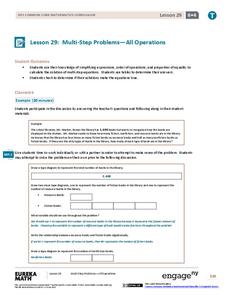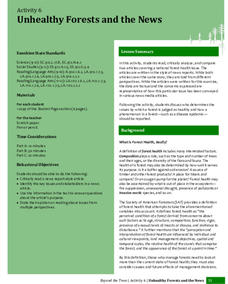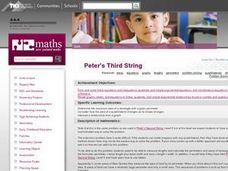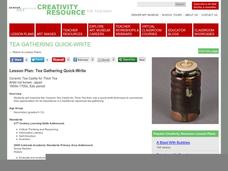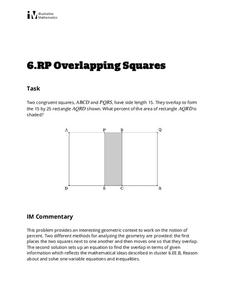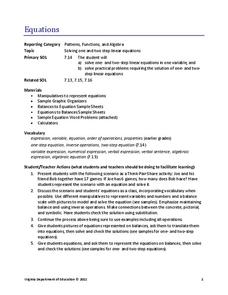EngageNY
Representing, Naming, and Evaluating Functions (Part 2)
Notation in mathematics can be intimidating. Use this lesson to expose pupils to the various ways of representing a function and the accompanying notation. The material also addresses the importance of including a domain if necessary....
Code.org
While Loops
Bring your pupils in the loop with while loops. Scholars learn how to modify conditional statements to produce while loops in the 14th lesson of the series. They use flowcharts to understand loops and then program some examples of...
Mathematics Assessment Project
Modeling Motion: Rolling Cups
Connect the size of a rolling cup to the size of circle it makes. Pupils view videos of cups of different sizes rolling in a circle. Using the videos and additional data, they attempt to determine a relationship between cup...
EngageNY
Multi-Step Problems—All Operations
Harness the power of algebra to solve problems. Young mathematicians learn to work out multi-step problems by applying algebraic techniques, such as solving equations and proportions. They use tape diagrams to model the problem to finish...
DiscoverE
Paper Tower
Read all about it! Challenge your class to build taller and stronger. Newspapers provide the means to build towers in a simple activity. Scholars try to build as tall a tower as possible with just two sheets of newspaper.
University of Florida
Unhealthy Forests and the News
Everyone knows a tree makes a sound when it falls, but what do we know about dying trees? Class members learn background information about Laurel wilt disease from a teacher-led presentation. Team members work with partners to read and...
Curated OER
Inquiry into Consumer Products
Students recognize different consumer products, found in and around the home, that have reactive or denaturing properties when used together. They explore chemical and physical properties of each product by identifying chemical formulas...
Curated OER
Peter's Third String
Explore the solution to a word problem involving area and perimeter. Learners read and discuss how to approach the problem. In small groups, they determine the maximum area of a rectangle with a given perimeter using a piece of string....
Explore Learning
Quadratics: Polynomial Form
Throught this subscription-based sight, learners explore different aspects of the parabola by changing equations from standard to vertex form. Next, find the general form of the vextex based on the values of a, b, and c, and investigate...
Curated OER
Measurement: 2D and 3D
Students solve volume problems. In this geometry lesson, the class watches a video about clean water (link provided) and individuals compare the volume of different prisms, including an actual drinking glass. Extension activities include...
Curated OER
Inquiry Unit: Modeling Maximums and Minimums
Young mathematicians explore the maximun area for patio with the added complexity of finding the mimimum cost for construction. First, they maximize the area of a yard given a limited amount of fence and plot width v. area on a...
Curated OER
Systems of Linear Equations
Introduce the inverse matrix method to solve systems of linear equations both algebraically and graphically. Using given data, your class checks their answers with graphing calculators. Handouts are included in this well-thought out lesson.
Curated OER
What's in a Name?
Students explore the plants that grow in Glacier National Park. In this plant biology lesson, students invite a guest speaker to speak about plants that grow in Glacier National Park, as well as the scientific names for the plants....
Curated OER
Weighted Averages
Weighted averages can be tricky to explain! However, this study guide makes it easy for teachers by including definitions, explanations, and breaking down problems into three steps. Includes mixture problems and uniform motion problems.
Denver Art Museum
Tea Gathering Quick-Write
Japanese tea gatherings are the inspiration for a great lesson. Learners are provided with an image of a tea caddy made for thick tea and asked to describe what they notice and what that might mean. This leads into a larger lesson about...
Illustrative Mathematics
Overlapping Squares
The objective of this activity is to find the percent of the area of a two squares overlapping. Mathematicians find the ratio of area for the part that overlaps to the rectangle formed. The final answer is a percent as a rate per 100....
Illustrative Mathematics
Finding an Unknown Angle
Teach your class how to apply their knowledge of geometry as they explore the unknown. In order to find an unknown angle, students must understand that rectangles have four interior right angles, that right angles have 90 degrees, and...
PBS
Garden Grade 6 Area and Perimeter
Engage young mathematicians in applying their knowledge of area and perimeter with a fun geometry lesson. Through a series of problem solving exercises, children use their math knowledge to design different-sized garden...
Curated OER
Solving Linear Equations
How do you solve linear equations? Learn how to solve simple linear equations by applying properties of equality in this instructional slideshow. The materials include step-by-step instructions and key concepts to support understanding.
Curated OER
Linear Equations Game
Students participate in a mathematics game in order to investigate the concept of linear equations. They practice using rotations of the game to solve the equations. The teacher can intervene as necessary.
Virginia Department of Education
Equations
Science equipment can be handy for math class, too. Scholars learn to solve one- and two-step linear equations by using the concept of a balance. They solve real-world problems in a variety of contexts by writing and solving linear...
Curated OER
Operations on Polynomials
Students simplify and reduce polynomials. In this algebra lesson, students find the sum, difference, product and quotient of polynomials and monomials. They use the order of operation correctly.
Curated OER
Ratio and Proportion: Basic Operations and Applications
Learners explore example problems dealing with ratios and proportions. Afterward, they read story problems and solve them using ratios and proportions. This four-page worksheet contains six multi-step problems.
Curated OER
Solving Absolute Value Inequalities
Start this activity with a brief description of how to solve absolute value inequalities. A space is provided to help classify the inequalities into types (greater than, less than, or equal to) and for learners to show how to graph their...
Other popular searches
- Expressions With Variables
- Expressions and Variables
- Expressions Variables
- Expressions With Two Variables





